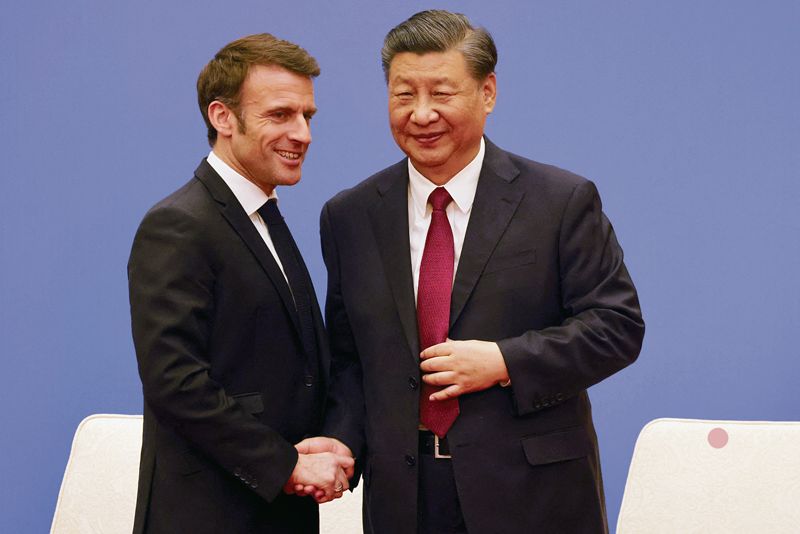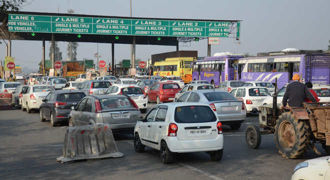
CONTROVERSY: French President Macron (L) caused a storm over his statements after his recent visit to Beijing, where he met his counterpart Xi Jinping. Reuters
Luv Puri
Journalist and Author
FRENCH President Emmanuel Macron, who is fighting a domestic battle over the controversial pension reforms, visited China recently and caused a storm over his statements. The French leader was reportedly accompanied by more than 50 French business leaders, including the top bosses of Airbus, EDF and Veolia.
After the trip, Macron raked up the issue of European Union’s (EU) strategic autonomy and emphasised that Europe should not become an extension of the US foreign policy.
In one of his interviews after the visit, Macron was quoted as saying: “The question Europeans need to answer…is it in our interest to accelerate (a crisis) on Taiwan? No. The worse thing would be to think that we Europeans must become followers on this topic and take our cue from the US agenda and a Chinese overreaction.”
“Europeans cannot resolve the crisis in Ukraine; how can we credibly say on Taiwan, ‘watch out, if you do something wrong we will be there?’ If you really want to increase tensions that’s the way to do it,” he added. The statement had its focus on avoiding the US-led position on Taiwan as it will irk China but it also came in the context of reports in the US media that ‘Chinese companies, including the ones connected to the government in Beijing, have sent Russian entities 1,000 assault rifles and other equipment that could be used for military purposes.’
Beijing and Moscow have taken symbolic steps to showcase their cooperation. On March 22, Chinese President Xi Jinping visited Moscow; last year, Russian President Vladimir Putin was in Beijing to declare a rhetorical foreign policy formulation between the two countries called ‘no-limits’ partnership.
With this background, the French President’s statements during his visit to China surprised many as it came in opposition to the US bid to create a cohesive front against Russia. This front is predicated on getting support from major powers in Europe, namely Germany, the UK and France. The US has also criticised China for backing Russia in the last one year on various platforms, including the United Nations Security Council (UNSC). The US has got support from Ursula Gertrud von der Leyen, President of the European Commission, who was visiting China around the same time as Macron. She said if China provided arms to Russia, it would be against international law and “significantly harm” the relationship between the EU and China.
In contrast, Macron’s approach was conciliatory. French ruling elite has always taken pride in projecting its own independent foreign policy in the post-World War II scenario and it has not shied away from taking a position in contrast to the US stance on critical global peace and security issues. In 2003, France had famously opposed the US invasion of Iraq, which took place without a UN mandate under the pretext that Iraq had retained weapons of mass destruction. In hindsight, France’s position was vindicated as the invasion arguably led to sectarian chaos in Iraq, which is still going on, with the state institutions beyond immediate repair.
This time around, the tone and tenor of the French President are in the context of ongoing tectonic shifts in parts of Europe. Some European countries, particularly bordering Russia, including Nordic and Eastern Europe nations, are feeling threatened by the Russian invasion of Ukraine. Finland, which shares a 1,340-km border with Russia, became the 31st member of the North Atlantic Treaty Organisation (NATO) after Turkey’s Parliament voted to approve its application. Sweden’s application is pending as it is blocked by Turkey, which has accused the country of embracing Kurdish militants. Article 5 of the NATO treaty commits signatories to the collective defence of one another.
The same way the danger is understandably existential in Eastern Europe. Poland, which had its historical animosity with the Soviet Union, along with Hungary and the Czech Republic officially joined NATO in 1999. There are countries like Bulgaria, Estonia, Latvia, Lithuania, Romania, Slovakia and Slovenia (2004), Albania and Croatia (2009), Montenegro (2017) and North Macedonia (2020) that have joined NATO in the past 20 years.
However, the lesser-known fact is that there are many countries in the geographical space of Europe, including Russia and five EU member states, which are still not part of the NATO for various reasons. Some countries like Austria, Ireland and Switzerland are neutral because of their Constitution that binds them to take that stance and others like Moldova don’t want to be part of NATO as this will irritate Russia. Countries like Georgia and Belarus currently have pro-Russia leaderships though there is a sizeable and vocal section in these countries, particularly the younger population, which wants to break out of the Russian orbit.
These nuanced differences are important factors, particularly for developing countries such as India, which are continuously calibrating themselves over the Ukraine crisis in line with their political and economic interests. Russia-China closeness, politically and militarily, is a fact, but this doesn’t mean this will initiate European decoupling from China. China, with its huge population and much better human resources in the realm of manufacturing, has an outsized advantage. Its economy is well-integrated regionally, including manufacturing units and supply chains, and there is a better and efficient systematic inter-provincial linkage within China for ensuring the safety of investments in manufacturing.
The invasion of Ukraine may have been seen by many countries within Europe as an existential threat. Some of the Asian economic powerhouses such as Japan and South Korea also openly opposed the invasion as they believed that it would incentivise a similar reckless action by China in the region. However, the French President’s visit to China clearly hints that the Biden administration’s trans-Atlantic thrust to crack down on the Russia-China alliance on many fronts is facing opposition due to existing economic realities and interests on the ground.
Join Whatsapp Channel of The Tribune for latest updates.




























